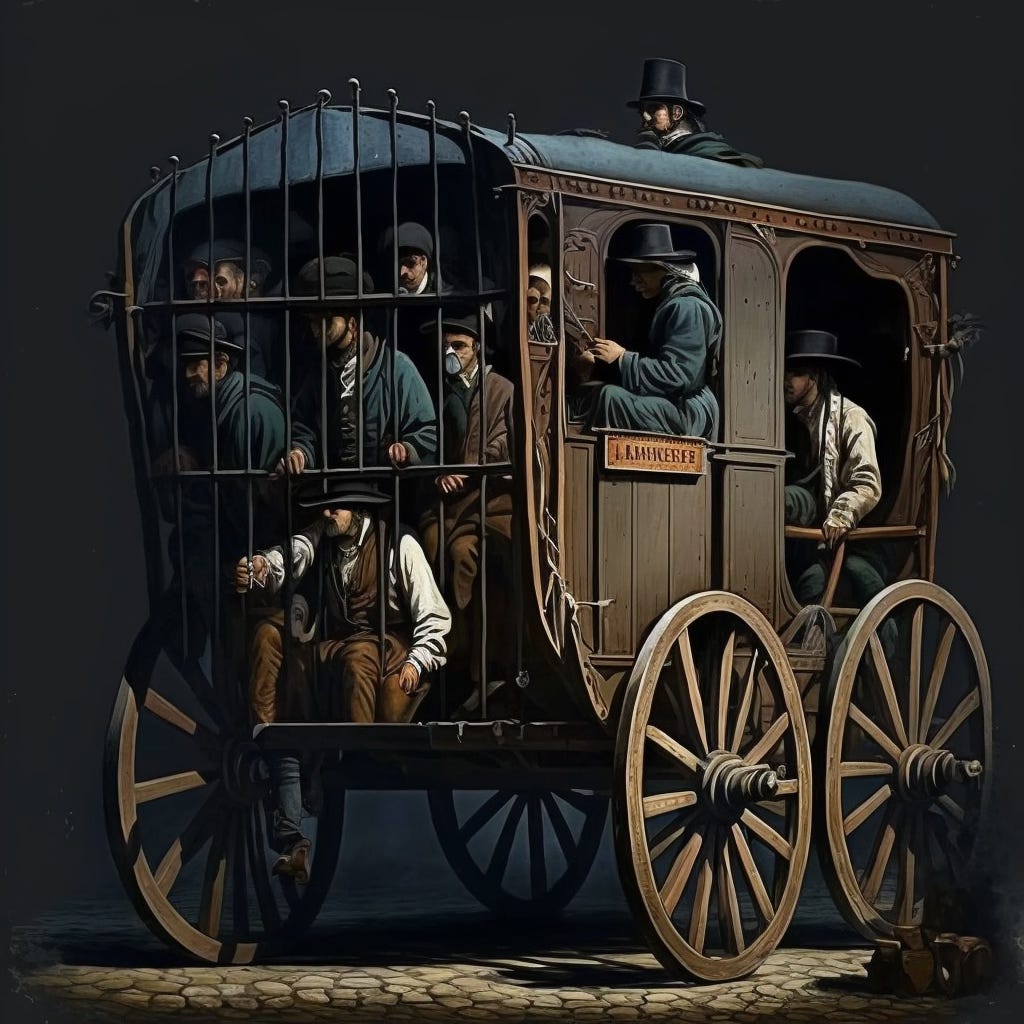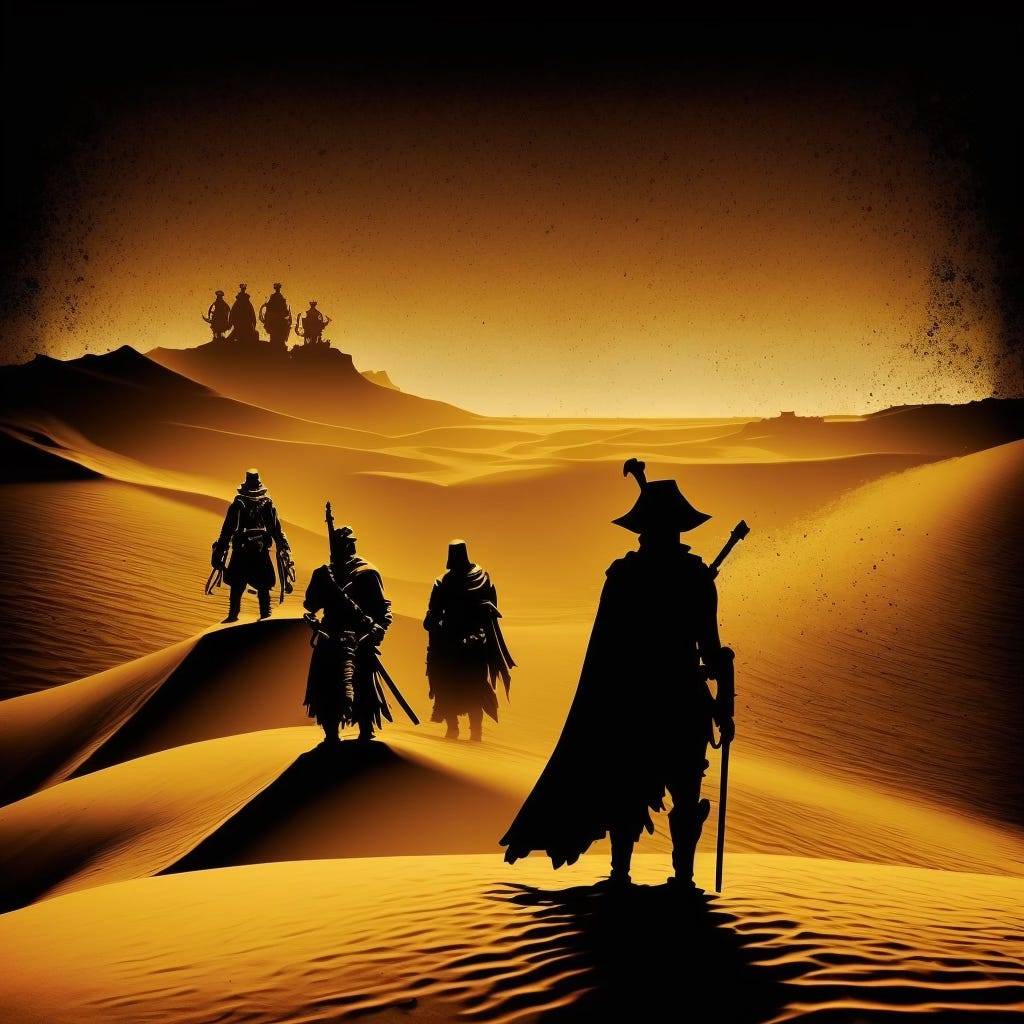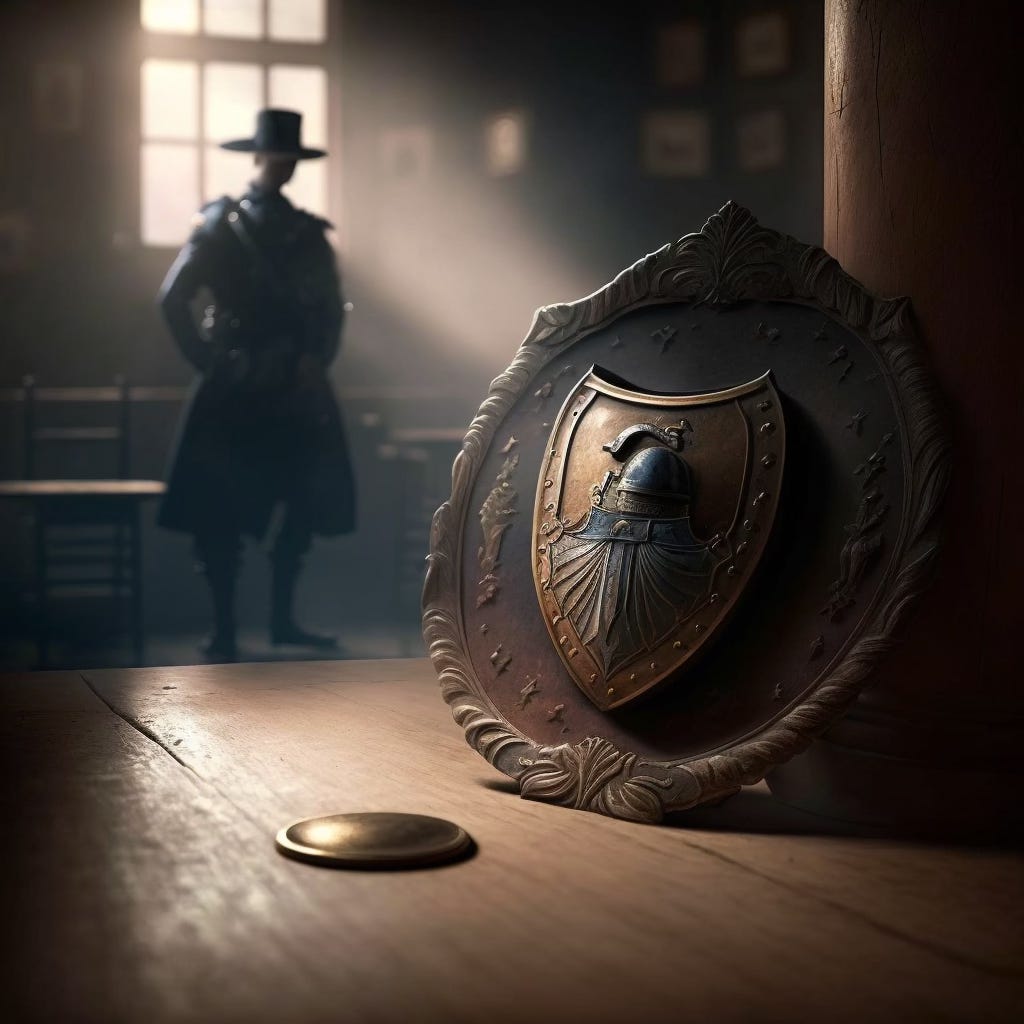War has come to the Discworld! When Jingo came out in 1997, readers looking for another light-hearted Fantasy romp were understandably perplexed; some began to complain that Terry Pratchett wasn’t as funny as he used to be and that his books were becoming a bit too ‘serious’ for their own good.
When I first read Jingo, aged perhaps 13, I was inclined to agree – my memory of this novel was of mild disappointment. But re-reading it as an adult couldn’t have been more different: Jingo takes Discworld to the next level of its evolution. There’s still plenty of humour, silly skits, and ample wordplay, but here, and as the series continued, we can feel Pratchett reaching for more.
The themes are bigger and more challenging: unlike the preceding City Watch novels, whose plots centred upon magical creatures or devices, Jingo is powered by the darkness of human nature itself. Its story deals very directly with how we treat and think about different people and cultures, and how easily everyday fear, prejudice and alienation can escalate into violence.
These are frictions that exist in any society, but which are enflamed and often explode in the brutal environment of war. In this case, the conflict is between the mercantile Ankh-Morpork and the Arabian Nights-themed country of Klatch. The road to war follows a script familiar from wars past and present in our own world: it begins with a territorial conflict, when the mysterious island of Leshp appears in the ocean. Both powers claim it as their own – not because it offers natural resources, but because its location is considered strategically important.
If the assassination of Franz Ferdinand on the streets of Sarajevo in 1914 was the spark that lit the fuse of the First World War, this time it’s the attempted assassination of the Klatchian Prince Kalif during a state visit to Ankh-Morpork. As always, Commander Sam Vimes finds himself at the centre of the storm; as he and his officers investigate the attack, they’re rapidly drawn into a world of political machinations and struggle to find their way through a dangerous moral maze.
What unfolds is a remarkably dark, nuanced story about prejudice, politics and personal responsibility, but all delivered with Pratchett’s signature wit. It’s a book that often made me laugh out loud, but in it we also come to see Vimes, his fellow officers, and the Discworld itself in an entirely new and sometimes challenging light.
Klatchians?
Before war breaks out, we encounter a Vimes very different to the one we met in Guards! Guards! The despairing alcoholic who felt abandoned by life is now the Commander of an increasingly professional and effective City Watch, is married to the richest woman in the city, and has – against his will – effectively become part of the establishment. He can now call himself a duke and a knight of the realm, but he’s still an outsider compared to the blue-blooded aristocrats who wield their influence with the kind of arrogance and bombast that one can only inherit. Vimes will never have that blood in his veins – if you cut him, he would bleed pure copper.
With war approaching, normal, everyday certainties erode and nobody is safe from being branded a traitor and potential terrorist. The ordinary Klatchians who’ve long lived in Ankh-Morpork are the first to feel the pressure. Instructed by the bellicose Lord Rust to arrest all the Klatchians in the city, Vimes wants to know what law they’ve broken. Rust waffles on about spies and sabotage, but the bottom line is that he’s placing the city under martial law. Vimes’s voice drips acid as he responds: ‘What kind of law’s that sir? […] Is it he kind where you shout “Stop!” before you fire, sir, or the other kind?’.1
This is the Vimes I know and love – the Vimes who’ll not only see that the emperor has no clothes, but will shout it to the rooftops and try to shake some sense into everyone around him. Vimes is the anti-spin doctor, a man who consistently tells the truth, no matter how inconvenient.
As tensions simmer across the city, Vimes reflects on how little he’s thought about the Klatchian minority in Ankh-Morpork. He’s used to seeing (but is always a little surprised by) Klatchian-looking people opening their mouths on the streets and speaking with a heavy Ankh accent. Now, as jingoism grows, anti-Klatchian mobs stalk the streets looking for a fight. When Vimes is called to a Klatchian takeaway run by Mr Goriff and his family, he’s confronted with how little he’s tried to learn about these people.
The Goriffs settled in town a decade ago and have become part of the fabric of Ankh-Morpork life; seemingly accepted, but never truly integrated. There’s something bittersweet about the off-kilter name Goriff chose for his business: ‘Mundane Meals’ (he wanted a word that meant ‘everyday’ or ‘straightforward’ and picked the one he most liked the sound of). It’s funny, but it’s also a sign of how two cultures or peoples can mix and interact while never quite being fully intelligible to each other.
Of course, it also depends how much effort you’re willing to make. When Captain Carrot starts chattering away to Mr Goriff in fluent Klatchian, Vimes is brought up short: why has he never tried to learn more than the handful of words required to order a curry? Why, come to think of it, are the only words he knows in Troll or Dwarfish the ones he needs to break up a fight?2
He feels guilty, though he’s not quite sure if he should be. After all, he’s the native, and these are the immigrants; why should he adapt to their culture, rather than they to his? Still, how many generations does it take before ‘native’ begins to include a whole lot more languages, cultures and ideas than Vimes grew up with?
Goriff’s teenage son, Janil, has spent his whole life wrestling with those issues. As war breaks out, his parents want him to fight for Klatch – but that’s a place he’s never even seen. In this moment he realises that he’d be just as much an outsider in Klatch as he now feels he is in Ankh-Morpork. Nevertheless, Ankh-Morpork is the place he calls home, and he’d rather stay behind ‘and defend what’s ours’.3 He doesn’t just mean their takeaway; what’s theirs, today, is a life that includes both cultures – however awkward, inconsistent and unclear that might feel.
As Janil knows all too well, cultural integration can feel like trying to mix up several jigsaw puzzles and then expect them to form one picture. Should Vimes feel guilty for not trying to learn Klatchian? Should the immigrants in Ankh-Morpork expect to fit into this new culture without losing something of themselves in the process? These are complicated, challenging ideas, and it’s a Pratchett trademark to bring them to the surface without forcing us to see them from only one perspective.
Changing Minds
Vimes is someone who’s always worried that he might fall on the wrong side of a moral equation, but while he’s busy soul-searching, Sergeant Fred Colon becomes the mouthpiece for everyday prejudice. As war draws closer, Fred tries to make sense of things by falling back on tired clichés and lazy slurs, like calling the Klatchians ‘rag-heads’.
And so we find Fred reeling out casually racist folk wisdom to Corporal Nobby Nobbs: ‘the moment [the Klatchians] taste a bit of cold steel they’re legging it away over the sand’.4 But, in Fred’s view, they’re also dangerous, vicious fighters. Confused, Nobby asks, ‘You mean, like … they viciously attack you while cowardly running away after tasting cold steel?’.5
Once again, Pratchett doesn’t preach – he just allows Nobby’s naïve questions to increasingly reveal the unacknowledged contradictions in Fred’s predictable spiel. Later on, the bigotry becomes cruder still: after banging on about eating sheep’s eyeballs and having multiple wives (leaving Nobby non-plussed), the exasperated Colon says:
‘Look, Nobby, when all’s said and done they ain’t the right colour, and there’s an end to it.’ […]
‘Er … what is the right colour?’ said Nobby.
‘White, of course!’
‘Not bright-red, then? ’Cos you––’
‘Are you winding me up, Corporal Nobbs?’
‘’Course not, sarge.’ […]
‘White’s … white’s a state of, you know … mind,’ he said. ‘It’s like … doing an honest day’s work for an honest day’s pay, that sort of thing. And washing regular.’
‘Not lazing around, sort of thing.’
‘Right.’
‘Or … like … working all hours like Goriff does.’
‘Nobby––’
‘And you never see those kids of his with dirty clo––’
‘Nobby, you’re just trying to get me going, right? You know we’re better’n Klatchians. Otherwise, what’s the point?’6
Colon’s becoming more and more flustered, and it’s not hard to see why. He doesn’t really know how these thoughts ended up in his head; he never consciously chose to put them there, and Nobby’s painfully reasonable questions are pushing him closer to having to face the truth. He knows almost nothing about the Klatchians, but he does know they’re different, and right now they’ve become the enemy. With war just around the corner, Fred is desperate to find a way to explain what’s happening in order to calm his nerves; he’s scrabbling around for reasons – any reasons – that could bring a sense of order to the chaos, and a sense of power to ‘us’ as compared to ‘them’.
As Pratchett says, ‘Sergeant Colon had had a broad education. He’d been to the School of My Dad Always Said, the College of It Stands to Reason, and was now a postgraduate student at the University of What Some Bloke In the Pub Told Me’.7
In other words, like so many of us, Fred isn’t keen on thinking for himself. As we saw in Feet of Clay, it can feel so much safer to fall back into automatic Golem thinking.
Fred’s boss Vimes deplores this kind of thinking; however much Vimes struggles with his feelings about Ankh-Morpork’s increasingly multicultural atmosphere, he would never use crude slurs to mock or diminish someone from a different group, either to their face or behind their back. When he overhears one of Fred’s tirades, Vimes calls him to his office for a quiet word. Fred doesn’t really understand the problem, telling Nobby after his dressing-down that he doesn’t care what people call him, after all – maybe Vimes is just running on too little sleep. ‘He’s a very busy man, Fred,’ Nobby says amicably. Fred pauses a moment before correcting him: ‘It’s Sergeant Colon, thanks’.8
Even if Vimes’s intervention might stop Fred calling Klatchians ‘rag-heads’, it doesn’t change anything about his thinking. Pratchett’s putting his finger on something important here: how can we move from policing particular words to genuinely changing minds?
Surprisingly, it’s the bumbling Nobby Nobbs who makes the real difference here: all his naïve-sounding questions aren’t just there to give us a few laughs at Fred’s expense. Asking questions like these is perhaps one of the only ways to gradually change someone’s mind, to encourage them to discover the holes in their own beliefs. Reading these scenes, I couldn’t help but think of the story of Daryl Davis – an African-American who befriended and converted hundreds of racists in the American deep south. Not by confronting, shaming or berating them, but by coolly and calmly, yet persistently and pointedly, asking the questions that allowed them to dismantle their own prejudices.9
Pratchett both understood that real, lasting change is a gradual process rather than a magical epiphany. As the dust settles and the war fizzles out, Fred and Nobby arrive back home; naturally, they are in dire need of a pint. But they decide not to return to The Klatchian’s Head – a favourite pub with a severed head hanging above the door (even if the head’s wooden today, it used to be the real article). They don’t admit to each other, or to themselves, that it now feels tasteless to drink there after spending time in Klatch and discovering it’s full of people rather than caricatures. They just say it’s a crap pub anyway and head somewhere else.10
This isn’t a radical change, but it’s a realistic one. Pratchett doesn’t make his characters have sudden U-Turns in their beliefs and perspectives; Fred and Nobby don’t become cosmopolitans overnight just because they spent a few days abroad… but he does show that change is possible if people can come to it themselves.
Trying to Be A Good Man
Vimes’s powerful urge to be a Good Man comes with its own challenges. In his effort to avoid the lazy thinking and casual prejudice he sees in Fred Colon, Vimes takes extra care not to allow bad, resentment-fuelled assumptions to cloud his judgement. As a result, he becomes incapable of believing that a Klatchian could be the prime suspect in the assassination attempt – because to do so would be to vindicate the suspicious, intolerant opinions that he despises.
71-hour Ahmed breaks it to Vimes gently:
Shall I tell you how I know you are a good man, Sir Samuel? […] After the attempt on the Prince’s life I suspected everyone. But you suspected only your own people. You couldn’t bring yourself to think the Klatchians might have done it. Because that’d line you up with the likes of Sergeant Colon and all the rest of the Klatchian-fags-are-made-of-camel-dung brigade.11
Vimes’s efforts not to fall into the xenophobic quagmire have cost him a vital piece of the puzzle. His mind whirling in the face of Ahmed’s knowing grin, Vimes at first refuses to believe that the assassination attempt was a false-flag operation: Prince Cadram wanted his brother killed and for Ankh-Morpork to be blamed. That – more than any territorial skirmishes over a small island – would be a true cause for war, and a means for Cadram to finally unite the disparate tribes of Klatch under his ultimate rule.
Seeing his disbelief, with a sigh Ahmed says, ‘Be generous, Sir Samuel. Truly treat all men equally. Allow Klatchians the right to be scheming bastards, hmm?’.12 Ahmed forces Vimes to confront something deeply uncomfortable: to truly treat everyone equally cannot mean turning a blind eye.
Entirely by accident, driven by the best of intentions, Vimes has actually fallen into the same trap as people like Fred: he’s begun to see individuals as representatives of a mass. Although he tries to treat each person in front of him on their own terms, his inner watchman has become too quick to accuse him of bias, bigotry and bullshit. As a result, he starts giving the Klatchians special treatment; whether or not this is justified because of the bad treatment they usually receive, it’s not the equal treatment Vimes actually strives to give. Just as Vimes’s apparent racism in Men At Arms set my childhood head spinning, this book did it all over again. Vimes’s struggles offer us a potent warning: sometimes, trying too hard to be the good guy may come at the cost of honesty, fairness and insight.
Following Orders
These are some pretty profound topics and ideas to be explored through the often-hilarious pages of a Fantasy novel, but in Jingo Terry Pratchett takes us deeper still. For Pratchett’s generation, the terrible consequences of war were visible everywhere and were not confined to news broadcasts or the pages of history books. When he grew up, he could see the harsh legacies that war had etched into the broken bodies of the men who fought in the trenches of the First and Second World Wars.
Pratchett was witness to realities that we seldom experience today, and he was clearly channelling some of these personal memories through Vimes:
What he remembered most, among the descriptions of puddles filled with blood and the flying limbs, was the time one old man said, ‘An’ if your foot caught in something, it was always best not to look and see what it was, if’n you wanted to hold on to your dinner.’ He’d never explained what he meant. The other old men seemed to know. Anyway, nothing could have been worse than the explanations Vimes thought of for himself. And he remembered that the three old men who spent most of their days sitting on a bench in the sun had, between them, five arms, five eyes, four and a half legs and two and three-quarter faces.13
As a history student, I often thought about war, but not because I was interested in the gung-ho accounts of army movements or the blow-by-blow retelling of their battles. I was fascinated by how people conduct themselves during the conflicts that turn their whole world upside-down. One of the most surprising things I learned was that the people who commit even the most horrific crimes were often entirely unexceptional. They weren’t psychopaths or even violent before war broke out – they were usually entirely ordinary men who were ordered to do terrible things. But there are always some who refuse to blindly follow orders.
When Vimes is ordered to arrest the Klatchian immigrant community and enforce arbitrary martial law on Ankh-Morpork, he’s faced with a profound moral dilemma. Can he live with himself if he follows these orders to round up innocent people, whose only ‘offence’ is that they’re Klatchian?
He ought to stay here, and do the best he could.
But … history was full of the bones of good men who’d followed bad orders in the hope that they could soften the blow. Oh, yes, there were worse things they could do, but most of them began right where they started following bad orders.14
War has the potential to turn even good men like Vimes into monsters; when other people do your thinking for you, it can easily feel like nothing you do is truly your responsibility – it wasn’t your idea, after all.
Vimes takes a drastic, dangerous step: he resigns as Commander of the City Watch. To him, being a police officer means keeping the peace and protecting the rights of every individual; an order that demands the blanket arrest of an entire population is a betrayal of everything he believes in.
A general might say that, to protect the kind of fair society that Vimes serves and protects, it’s sometimes necessary – however regrettable – to fight a war to defend it. But Vimes rejects this outright: to him, if murder and the destruction of property are a crime, then war is just the same thing on a much bigger scale. It’s the same mentality that he brings to a pub brawl: his duty is to break up the fighting and try to restore or maintain the peace.15
This could seem trite, foolish, or at least deeply unrealistic. But this is sometimes what fiction is for: to shake the cynical scales from our eyes and help us to imagine another reality which could exist if we only allowed ourselves to believe in it.
Doing The Right Thing?
Vimes decides to take matters into his own hands. After giving up his badge, he resolves to set sail for Klatch to find the assassin, solve the crime, and stop the war.
When people like Vimes break with the rules, their future is deeply uncertain. Doing the right thing comes with no guarantees: they will either be remembered as conscientious objectors (perhaps even heroes) with the moral muscle to stand against the tide, or they will be remembered as villains who fell on the wrong side of History. Vimes only has to think of his ancestor, Old Stoneface Vimes, who became a villain in the history books, or of how Ahmed’s ‘71-hour’ nickname forever brands him as a man who broke a sacred social duty, even if he did it to avenge a terrible crime.16 Glory is far from guaranteed, but whatever your place in the history books turns out to be, there’s always the nagging feeling that you might be in the wrong.
Fate hangs on Vimes’s decision: in one reality, he stays home; in the other, he heads to Klatch. In a quintessentially Pratchett move, the Vimes in each reality somehow picks up the other’s smart personal organiser (a kind of magical Blackberry powered by a tiny imp).17 It’s a brilliant conceit which means that, for the rest of the book, Vimes constantly receives disturbing updates from the reality in which he stayed home. It’s not a pretty picture: the war goes badly, Ankh-Morpork is invaded, and one by one Vimes and his officers die in the fighting. Here, writ large, is the price of not stepping up to do the Right Thing.
But how do we know what the Right Thing is?
Heroes in stories usually trust their gut, but that’s a dangerous bet for Sam Vimes: he knows there’s a ‘Beast’ – an inner darkness – hiding inside his soul. That’s why he clings desperately to the Law – to a system that’s supposed to ensure fairness and justice for everyone and to protect them from tyranny.
But what happens when the law allows terrible things to happen? Pratchett reminds us that, in war, the normal rules aren’t just suspended, they’re turned upside-down. Murdering a Klatchian in peacetime Ankh-Morpork would be a serious crime; that it was done from ethnic hatred would make it even worse in the eyes of society. But, out on the battlefield, the same act could get you a medal. In war, soldiers are killed for the uniform they wear, not the content of their character.
Even in peacetime liberal societies it’s foolish to assume that ‘Legal’ and ‘Illegal’ are always the same as ‘Right’ and ‘Wrong’. That’s why they have trials to take into account the nuances and mitigating circumstances, the character, and the broader behaviour of the accused.
So what happens when the law runs out? What happens when the system itself creates an order that harms rather than protects the people? As 71-hour Ahmed says to Vimes during their coppers’ heart-to-heart: ‘All I know is, there must be a policeman, even for kings’.18 He means a policeman who isn’t just a servant of the status quo, but a defender against authoritarianism. Doing that job sometimes means stepping beyond the law, beyond the current version of the way things are. And that means to step from a precipice, from order into chaos.
Vimes isn’t sure he’s up to it. At the climax of the novel, he stands back-to-back with Ahmed, crossbows in hand, demanding that the leaders of each side back down and stop the war before it spirals out of control. Will he have to pull the trigger? Can he pull the trigger?
With everything hanging in the balance, Vimes thinks back to Old Stoneface, who executed the last, degenerate king of Ankh-Morpork – another man who stepped beyond the law in order to do the Right Thing. As Vimes does so,
The sensation flowed into his veins like fresh warm blood. It was the feeling that you got when the law ran out, and you looked into a mocking face on the other side of it and you decided that you couldn’t go on living if you did not step over the line and do one clean thing––19
In this moment, Vimes is right back where we found him in Men At Arms, levelling a firearm – the ‘gonne’ – at the serial killer Dr Cruces. But this time, it’s not rage or the seductive lust for power coursing through Vimes’s mind – the Beast within is not screaming to break free in order to punish anyone who’s done him wrong. Just as Carrot executed Dr Cruces dispassionately, for the greater good, this time a calm clarity descends upon Vimes: if he does this thing, it’s because the law, the rules, have run out. Their aims can no longer be achieved within the current system, so doing the Right Thing, the clean thing, means stepping out beyond them.
It’s a familiar moment, even if we never get to experience it directly. Our folktales, our books and our movies are filled with the image of the lawman who lives on the edge of the law, dispensing a raw, street justice that no courtroom would recognise. Whether it’s executing a mob boss whose lawyers would have got him a plea deal, or letting a killer walk free because she was only avenging her family, these are the grey zones where the law peters out and we must touch the edge of chaos if we are to make something resembling justice possible.
It’s a dangerous line to cross. Society would crumble if it was full of vigilantes and anti-hero cops. But that doesn’t mean that sometimes, as in this moment, the issue is not real. Sometimes true, positive change can only happen when the status quo breaks down and we have to build something new – a new order – that’s both robust and flexible enough to accommodate new realities.
Once again, Vimes is saved from crossing that Rubicon (this time by Lord Vetinari, who steps in with a deceptive, political solution). But with every book in the series, he’s getting closer to pulling the trigger, to risking the emergence of the Beast. In a few books’ time, we’ll see what happens when there’s nobody around to save him from himself.
Jingo, pp.114-5. All references are to the 1997 hardback edition.
Jingo, p.43.
Jingo, p.126.
Jingo, p.28.
Jingo, p.29.
Jingo, p.131.
Jingo, p.28.
Jingo, p.48 (my emphasis).
See https://en.wikipedia.org/wiki/Daryl_Davis
Jingo, pp.282-3.
Jingo, p.234. For perplexed American readers, ‘fags’ is British slang for cigarettes.
Jingo, p.236.
Jingo, p.238.
Jingo, p.148.
Jingo, p.207. Pratchett gives us a nice contrast when he describes a Klatchian commander tasked with ‘pacifying’ the ever-unruly territories of Klatch. It’s a never-ending job, and the man wonders ‘why, if he was pacifying people, he always seemed to be fighting them’ (Jingo, p.206).
Ahmed executed a man who poisoned a whole village, but he did so while the man was his guest, before the customary three days of hospitality had elapsed.
Jingo, p.148.
Jingo, p.238.
Jingo, p.256.










